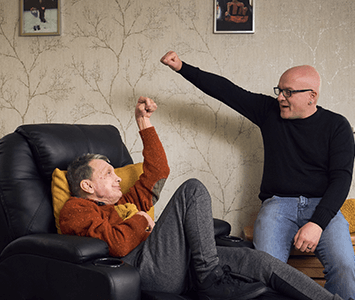By Darryl Richards, support worker
I first met Pedro (not his real name) as an agency worker.
Pedro came across as an angry man. He would ram things in his wheelchair, tip it up, shout and bang the floor, the walls and the doors. His staff told me not to worry; Pedro was ‘always like that.’ I was warned that he would hurt me if he could.
The person who told me this had supported Pedro for years. I had no reason to question her. Straight away, I bought into Pedro’s reputation and adopted the “don’t worry that’s just Pedro it’s what he does” attitude.
As support workers I bet this rings bells for you. Have you ever been warned about someone, been told they’re violent, challenging, awful? That person’s reputation precedes them like a bad smell.
I want you to make your own decision on that person. But first I must tell you a little more about Pedro and me.
I’m now employed by Discovery and by chance, Pedro moved in to the home where I work.
Sure, when he first moved in some of his behaviour was ‘challenging’ (he was anxious and distressed. He’d just had to move home.) Overall I thought that it went pretty well and I had the chance to watch Pedro’s behaviour carefully: what he was doing, when he was doing it, was there a trigger?
After a while it became obvious that Pedro found new people in his life difficult. New support workers would face distressed behaviour that would calm as soon as he was supported by his core team. Workmen and visitors also made Pedro anxious.
I also observed that Pedro became bored easily; boredom was another trigger for his anxiety and distressed (‘challenging’) behaviour.
As I worked with Pedro I began to build a relationship with him. I read his history; he had lived in a hospital based on the old asylum type of care and which would of course have shaped how he now reacts to things around him.
I also read about Pedro’s interests, and discovered that like me, he supports Bristol City. Like me, he enjoys a drink at the pub. Like me, he loves live music.
But at first I was told Pedro couldn’t actually do any of these things as his behaviour was so unpredictable.
I decided to challenge this historic negativity. As a team, and with Pedro at the centre of it all, we’ve now put a bold support plan together. The goal is for Pedro to be able to go to gigs and to regularly watch his beloved Bristol City, to have a pint in his local and to talk about the game afterwards with people who see the footie fan not the wheelchair.
If we never know this, it’ll feel like a bit of a failure – and none of us want to feel like that do we?My personal goal? For Pedro, and so many other people who are labelled as having challenging behaviour when actually they’re anxious and distressed, to lose their negative reputation. I hope this blog has gone some way to helping with that.
If this way of thinking has interested you, why not get yourself on a ‘meaningful engagement’ course. I did – I gained the tools to think about Pedro differently – what could it do for you and the person you support?
